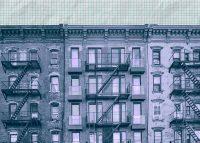For the next year, landlords cannot automatically increase rents on stabilized apartments.
The Rent Guidelines Board voted 6-3 Wednesday night to freeze rents for one-year leases and for the first year of two-year leases. During the second year of two-year agreements, landlords can bump rent up by 1 percent. The board approved a freeze on stabilized hotel units as well.
Read more


The board’s two landlord representatives asked for an increase of 2 percent on one-year leases and 5 percent on two-year agreements. The tenant representatives supported freezing rent increases on all leases. Neither of these proposals managed to get the necessary five votes.
Leah Goodridge, a supervising attorney with the Housing Project at Mobilization for Justice and one of the board’s tenant representatives, said while she doesn’t doubt that landlords are hurting from the pandemic, “one person’s business venture” shouldn’t be compared to tenants’ “literal survival.” She said that as the only African American member of the board, she was concerned about the silence around the pain expressed through protests across the country, while the board put too much emphasis on the “pain of landlords losing money” and not on hardships faced by minority tenants.
Prior to the final vote, tenant advocate groups had called for the rollback of rents by 2 and 3 percent on one-year and two-year agreements, respectively. In its 50-year history, the board has never decreased rents in this way.
The freeze is the third during Mayor Bill de Blasio’s six and a half years in office; the first two were in 2015 and 2016 for one-year leases. Wednesday marked the first time the board approved a freeze for any portion of two-year leases.
The decision was in line with the board’s preliminary vote last month. But even before that, a freeze seemed likely. De Blasio had repeatedly called on the board to forgo increases, and even one of the board’s landlord representatives acknowledged the logic of freezing rents on one-year leases, though she bristled at the idea of doing so for two-year leases.
Ahead of the final vote, Scott Walsh, a project director at Lendlease and one of two landlord representatives on the board, criticized the voting process as “little more than a theater” that was manipulated by the mayor. He said the RGB’s public members didn’t adequately understand the issues surrounding rental housing nor their duty to property owners.
“Public members must understand: Owners are members of the public, and you have an obligation to them through your service on this board,” he said. He went on to call on property owners to “continue the dialogue with public members and to write and communicate with them often to tell their stories.”
“When you are wondering how you are going to pay your increased property tax bill on July 1 this year and avoid an 18 percent penalty for any late payment, call the public members,” he said. “When tenants with jobs elect to not pay rent or assert false claims against you, call the public members. When your insurance carrier won’t renew your policy … Call the public members often, make yourselves heard at their workplaces.”
Tenant representative Sheila Garcia called Walsh’s comments “tone deaf” and rejected the idea that the board is made up of “puppets,” noting that some public members voted against her and Goodridge’s proposal to freeze rent increases on all leases.
Although the board’s landlord representatives ultimately proposed increases, the industry had shown little hope that the quasi-legislative body would approve anything other than a freeze. In fact, the Rent Stabilization Association sent over its statement in reaction to the vote nine hours before it occurred.
In the statement, Joseph Strasburg, the landlord group’s president, called Rent Guidelines Board members the mayor’s “puppets” for authorizing an “unjustifiable rent freeze under the guise of pandemic relief.”
“Typical de Blasio pandemic politics, denying owners of small buildings, mostly immigrants and people of color, the rent revenue needed to operate their buildings, finance capital improvements, infuse jobs and revenue into their neighborhoods, and pay property taxes that he raises every year,” his statement said. “They ignored the fact that New Yorkers received government stimulus and enhanced unemployment benefits, and that hundreds of thousands of households are either already back to work or returning in the weeks ahead.”
He also said City Hall should freeze property taxes. The City Council is considering two bills that would defer tax payments.
Over the last three months, the rent board held its meetings and hearings remotely, a process that some criticized for potentially excluding tenants who lacked access to the technology necessary to participate.
In its own reports, the board projected that increases of 2.5 percent and 3.5 percent for one-year leases and 3.3 percent to 6.75 percent for two-year leases would be needed to maintain net operating income for landlords of rent-stabilized buildings. According to one of the board’s reports, net operating income declined by 0.6 percent from 2017 to 2018, to $535 monthly per apartment — the first drop since 2003. The board’s reports are considered a starting point for the members’ deliberations on allowable rent increases.
The stakes this year — amid a crisis that killed thousands of New Yorkers — were considerably higher for board members, all of whom are de Blasio appointees. They were voting not only during a period of mass unemployment, but just one year after the Housing Stability and Tenant Protection Act of 2019 shook the rent-regulation landscape.
Before the pandemic, many in the industry thought the board would feel additional pressure to increase rents, given the rent law’s elimination of other mechanisms used by landlords to do so, including vacancy bonuses and high-rent decontrol. The law also curtailed owners’ ability to increase rents after completing apartment and building-wide renovations. Chair David Reiss noted that it was still too early to fully understand the financial impact of the pandemic and rent law on the city’s rental market, but the board would study the issue over the next year.
The law, along with guidance issued by the state’s housing regulator last year, created confusion over whether increases approved by the rent board could be applied to vacancy leases. The board didn’t explicitly address the issue Wednesday night, though Reiss said at the beginning of the hearing that guidelines applied to leases that commenced or were renewed on or after Oct.1.
Deborah Riegel, an attorney at Rosenberg & Estis, said she had no expectation that the rent freeze would lead the board to compensate landlords with larger increases after the pandemic. She pointed to the fact that the board approved freezes twice in recent years without a pandemic taking hold of the city.
“I’d like to hope it will be taken up next year, when presumably we will be in a different place in terms of the crisis, but I don’t know,” she said. “The problem is, it’s not a single occurrence.”
Write to Kathryn Brenzel at kathryn@therealdeal.com
